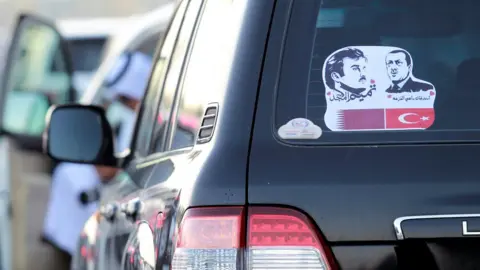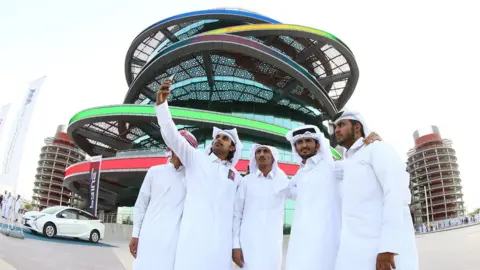Why is Turkey standing up for Qatar?
 Reuters
Reuters"Thank you Turkey for the milk!" posted one Twitter user from Qatar, along with a picture taken in a supermarket whose shelves were full of Turkish-brand bottles.
Over the weekend, fresh stocks of milk, yogurt, poultry and juice from Turkey were flown to Doha as the country faced a shortage of fresh produce due to the recent crisis in the Gulf - the worst in the past decade.
On Tuesday, Turkish President Recep Tayyip Erdogan described the isolation of Qatar as inhumane and against Islamic values, comparing it to a "death sentence".
His foreign minister is due to visit the country on Wednesday for talks about the crisis.
As Saudi Arabia, Bahrain, the United Arab Emirates and Egypt decided to sever all ties with Qatar, accusing it of supporting terrorism, Turkey's initial reaction was to try to refrain from taking sides and to call for dialogue.
But just two days later Ankara made a dramatic pro-Qatari turn.
 Twitter
TwitterThe passing of a bill to authorise the deployment of Turkish troops to Qatar was presented to the international community as a clear message: Doha is not alone.
In fact, the bill had been waiting for parliamentary approval for almost two years - long before the Qatar crisis erupted.
The two countries had already signed a military protocol back in 2015, and Turkey had opened a military base in Qatar - its first in the region, currently hosting about 100 Turkish soldiers, but with a capacity of up to 5,000 troops.
On Monday, the Turkish army sent a further three officers to co-ordinate the future deployment. Some reports suggest that Ankara will initially deploy infantry, then a naval force, followed by F16 fighter jets.
Ankara perceives Doha as one of its key allies, especially after Turkey's increasing isolation internationally.
Qatari Emir Sheikh Tamim bin Hamad al-Thani was the first leader to make a solidarity call to President Erdogan after the Turkish coup attempt last year.
Turkey-Qatar trade ties
$424m
Turkish exports to Qatar in 2015: main items sea vessels, electrical goods, furniture
$361m
Qatari exports to Turkey in 2015: main items petrol and derivatives, aluminium, plastic products
-
126% Growth of Turkish exports to Qatar since 2011
-
25% Decrease of Qatari exports to Turkey since 2011
There are even reports alleging that a 150-strong elite unit of Qatari special forces was sent to Turkey for close protection of Mr Erdogan after the coup plot.
The governments of the two countries also share similar ideological stances.
Neither classifies the Muslim Brotherhood or Hamas as "terrorist organisations"; both have condemned the military coup in Egypt that toppled Mohammed Morsi in 2013; and both have supported Islamist groups in their attempt to overthrow Bashar al-Assad's regime in Syria.
They also have the same attitude towards Iran. Both acknowledge that it is one of the key players in the region and try to maintain good ties - contrary to the Saudi demonisation of Tehran.
Qatar has also been investing heavily in Turkey - it ranks seventh in terms of Doha's foreign investments.
Turkish exports to Qatar are valued at more than $420m (£330m), and the emirate is seeking several arms deals with Turkish defence firms.
 AFP
AFPThe value of projects undertaken in Qatar by more than 30 Turkish companies, mainly in the construction sector, has reached approximately $8.5bn to date, according to official numbers.
And with the 2022 World Cup's preparations under way, Turkish contractors are eyeing the country for further investments.
Mr Erdogan has demanded an immediate end to the Qatar crisis, calling on the Saudi king to take the lead to resolve it.
Although taking a pro-Qatari position, Turkey does not want to be perceived as anti-Saudi.
What it wants first and foremost is a diplomatic settlement to restore the relations between the parties.
But if the tension escalates further leading to a military confrontation, or a coup, will Turkey still be prepared to stand by its recently adopted "brother"?
